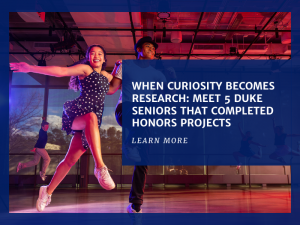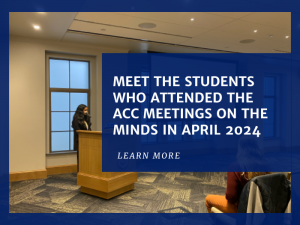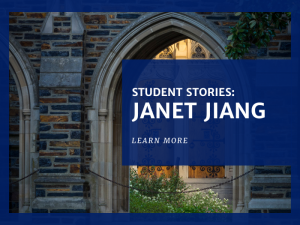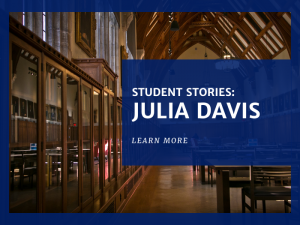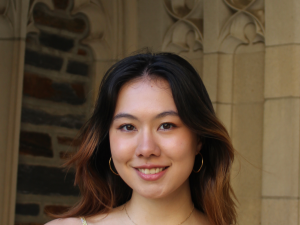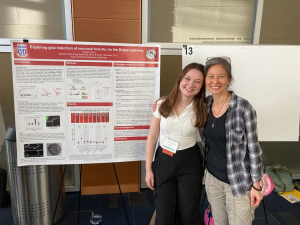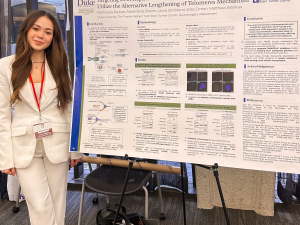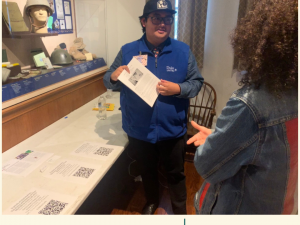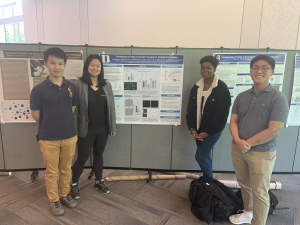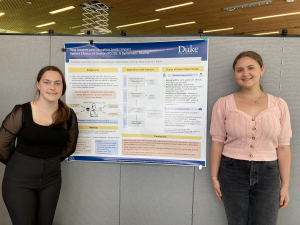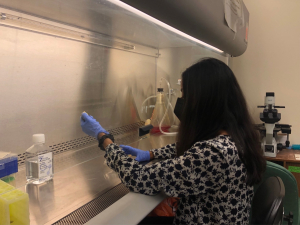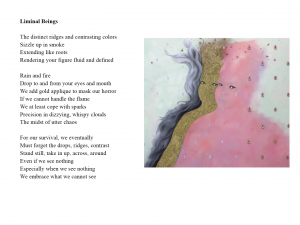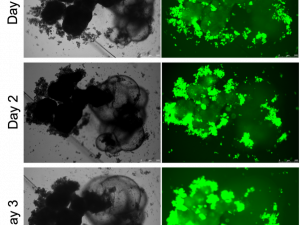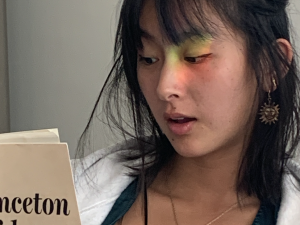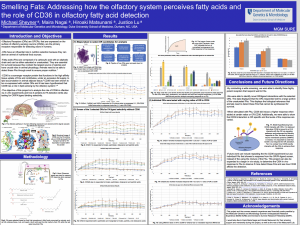Keshav Jha received a summer 2025 conference award from the URS Office to present at the 67th Annual AAPM Meeting in Washington, DC! Learn more about this experience.This past weekend, I had the opportunity to present my research at the 67th Annual AAPM Meeting in Washington, DC, alongside Victoria Parker and Joseph Farina. The conference brought together physicists, doctors, entrepreneurs, and students from around the world, all united by a shared passion for… read more about URS Conference Stories: Keshav Jha »
This Spring semester, Janet Jiang (2024) was awarded a URS Conference Grant to attend and present at the 2024 Technical Symposium on Computer Science Education.At the Symposium, Janet presented work on the relationships between students' modality, discussion behavior, and class sentiment in a hybrid course where students could self-select their modality for each lecture.When asked how the conference experience shaped her research goals, Janet described the learning experience: "The questions I received… read more about URS Conference Stories: Janet Jiang »
In the Summer of 2023, Julia Davis (2024) was awarded a URS Deans' Summer Research Fellowship award to explore parental engagement in families under the mentorship of Dr. Kenneth Dodge.Throughout the summer, Julia lead an evaluation of a pilot prenatal navigation program for 300 moms in eastern North Carolina using a survey of her own design. Julia also analyzed initial data from the pilot program.When asked how the DSRF experience shaped her view of her research, Julia emphasized the relationships she built… read more about Deans' Summer Research Fellowship Stories: Julia Davis »
In the Fall 2023 semester, Yuxi Long (2024), Yingjie Xu (2024), and Shiyou Wu (2024) utilized a URS Conference Grant to attend and present at the 28th ACM SIGPLAN International Conference on Functional Programming. At the conference, they presented work on a distributed computing framework for the functional programming language Haskell. When asked how the conference experience shaped his research goals, Yuxi noted: "I received feedback on the future possibilities of our prototype and the challenges of each possibility… read more about URS Conference Stories: Yuxi Long (2024), Yingjie Xu (2024), and Shiyou Wu (2024) »
In the Summer of 2023, Surya Cannon (2024) was awarded a URS Deans' Summer Research Fellowship (DSRF) award to investigate the "feedback loop" of cultural expectation and environmental reality in West Texas, comparing attitudes and actions of the Comanche and Anglo-Texan cultures, under the guidance and mentorship of Dr. Paul Jaskot. Surya studied how, where, and why settlements developed, how the land was used or managed, how that management continues to impact human-environmental wellbeing today… read more about Deans' Summer Research Fellowship Stories: Surya Cannon »
This Fall semester, Orion Kornfeld (2025) utilized a URS Conference Grant to attend and present at the Society of Vertebrate Paleontology conference.At the conference, Orion presented work that measured wear in the teeth of Eocene (30 million year old) fossil hyraxes. Through analyzing changes in tooth wear patters, diet could be inferred, and dietary changes over time could reveal climactic changesWhen asked how the conference experience shaped his research goals, Orion commented on the new field… read more about URS Conference Stories: Orion Kornfeld »
This previous summer, Jayden Cyrus (2024) was awarded a URS Deans' Summer Research Fellowship award to investigate the role of the loss of spastin gene in the development of Autosomal Dominant Hereditary Spastic Paraplegia (AD-HSP). The onset of AD-HSP can impair the motor function of the legs. Under Dr. Nina Sherwood's mentorship, Jayden explored the cellular pathway of the Draper engulfment receptor in Drosophilia larvae. "My DSRF experience allowed me to continue my research and get a… read more about Deans' Summer Research Fellowship Stories: Jayden Cyrus »
This Spring semester, Margarita Krylova (2026) used a URS Conference Grant to attend and present at the National Collegiate Research Conference.At the conference, Margarita presented her project which explores how the enzyme SMARCAL1 provides potential theurapetic benefits in glioblastoma cells. Margarita's project was mentored under the guidance of Dr. Matthew Waitkus. "Attending Harvard’s annual National Collegiate Research Conference provided me with invaluable insights into my research," … read more about URS Conference Stories: Margarita Krylova »
This previous summer, Amiya Mehrotra (2024) was awarded a URS Deans' Summer Research Fellowship award to study of how higher education can most effectively promote political participation in its programming under the mentorship of Deondra Rose.Amiya worked with Professor Nancy Thomas at Tufts’ Institute for Democracy and Higher Education to use National Study of Learning, Voting, and Engagement (NSLVE) data to identify an institution that has particularly extraordinary rates of student voter… read more about Deans' Summer Research Fellowship Stories: Amiya Mehrotra »
In the Summer of 2023, Annie Cui (2024) was awarded a URS Deans' Summer Research Fellowship award to study of COVID-19's impact on students' choices of majors, careers, and priorities under the guidance and mentorship of Dr. Nick Carnes. Annie was able to interview numerous students, advisors, professors and staff members on their experiences of the pandemic, their perception of student trajectory before, during, and after the pandemic, as well as their personal experiences of choosing majors and… read more about Deans' Summer Research Fellowship Stories: Annie Cui »
This previous summer, Andrew McCallum (2024) was awarded a URS Deans' Summer Research Fellowship award to better understand the Archive of Terror, a museum dedicated to preserving the record of Paraguay’s dictatorship. Under Dr. Christine Folch's mentorship, Andrew was able to travel to Paraguay to see the system that facilitated the reign of terror under which the country suffered suffered."My DSRF experience allowed me to ground my research in the realities of Paraguay’s past and present. The… read more about Deans' Summer Research Fellowship Stories: Andrew McCallum »
This Fall semester, Griffin Storm (2026) used a URS Conference Grant to attend and present at the UNC Water & Health Conference.Griffin is currently beginning his first research portfolio under the Hart Leadership Program. His project explores the history of the privatization of water, and what role privatization has (if any) in current times."The conference was extremely informative -- the privatization of water is inevitable, especially where water goes untreated and unmanaged by governments. It exposed me… read more about URS Conference Stories: Griffin Storm »
This Fall semester, Anya Gupta (2024) used a URS Conference Grant to attend and present at the Geologic Society of America's Annual Conference. At the conference, Anya presented her senior thesis project, mentored by Alan Boudreau, which loos at the petrogenesis of an ore bearing zone on the Stillwater Complex, Montana. "This conference was wonderful, because I got to connect with industry professionals, professors at other universities, and other students studying the geologic sciences," Anya reflected to… read more about URS Conference Stories: Anya Gupta »
This previous summer, Huiyin Zhou (2024) was awarded a URS Deans' Summer Research Fellowship award to investigate the strategies of political translation in diasporic Chinese feminist communities under the guidance and mentorship of Dr. Ralph Litzinger. In her hopes to understand transnational Chinese queer feminism, Huiyin organized and participated in at least 11 community-based events through CAO Collective. These events took place across the country, from Durham, New York, Los Angeles and… read more about Deans' Summer Research Fellowship Stories: Huiyin Zhou »
This Fall semester, Elaijah Lapay (2024) utilized a URS Conference Grant to attend and present at the North American Vexillological Association 57 (NAVA) annual meeting. At NAVA, Elaijah presented on the House Course that he instructs on vexillology and the study of nationalism and flags at the conference, and framing the concept of a "Vexillology 101" to future learners in the field. When asked how the conference experience shaped his research goals, Elaijah noted the strengthening of his professional… read more about URS Conference Stories: Elaijah Lapay »
In the Summer of 2023, Sage Cooley (2025) was able to use a URS Conference Grant to attend and present at the International Writing Across the Curriculum (IWAC) conference at Clemson University. At IWAC, Sage presented the results of a pilot study to increase genre integration and reduce activity system competition in a multi-section engineering first-year design class (EGR 101). Their work showed how navigating inter-activity system communications intentionally and metacognitively increases the versatility of… read more about URS Conference Stories: Sage Cooley »
Last spring, Lucy Zhang '23 (Biomedical Engineering), Paul Kim '23 (Neuroscience), Yasuhiko Komatsu '23 (Biomedical Engineering), Yiru Li '23 (Biomedical Engineering), and Angela Addae '24 (Neurobiology), received a Student Team Grant Award to explore and develop therapeutic treatments to address disease progression and cognitive decline in Alzheimer's patients. The project, "Alzheimer's No More: Targeting neuroinflammation-related neurodegeneration", focused on developing strategies to deliver siRNA into brain-resident… read more about Alzheimer's No More: Targeting neuroinflammation-related neurodegeneration »
In Spring of 2022, Brooke Bier '23 (Psychology) and Taylor Parker '24 (Chemistry) received a Student Team Grant Award to investigate how patients choose their doctors. Bier and Parker teamed up with mentors Dr. Cheryl Lin and Dr. Pikuei Tiu to explore how different patient variables, such as socioeconomic status and health literacy, play a role in healthcare decisions. Their project, "Information, Perceptions, and Public Health" dove deeper into patient choice and health decision-making research. By Brooke Bier… read more about Information, Perceptions, and Public Health »
In Spring of 2022, Fatima Massare Somers '23 (Program II Major) received a Student Team Grant Award to examine how art can help promote self-efficacy for patients in healthcare settings. Her project, "Art, Fear, & Healing in Medicine: Exploring Health Literacy & Empowerment through Visual Narratives", investigated how art can generate conversations about patients' fears and perceptions of healthcare. With the support of mentor Wesley Hogan, Director of Center of Documentary Studies, Fatima and her team… read more about Art, Fear, and Healthcare: Exploring Healthcare Literacy through the Visual Arts »
Uncontrolled hypertension can lead to dire outcomes, including chronic kidney disease and end stage renal disease. Lu et al. found that by knocking out A20 from mice, blood pressure was significantly elevated. Due to this, we predict that A20 is a critical player in regulating immune-mediated renal hypertension — and that upregulating A20 expression could protect against hypertension. We tested two known activators of A20, delta tocotrienol (DT) and gibberellic acid (GA3). We treated HK2 cells with both activators and found… read more about Elucidating the Antihypertensive Pathway of A20 »
Sandro Botticelli and Filippino Lippi's The Adoration of the Kings is a well-known case of collaboration between artists in the fifteenth-century Florentine workshops. Previously, arguments for the division of labor in the production of the painting mainly relied on traditional experts in fine art, whose opinions were largely subjective and often led to an insufficient account of the artwork's creation. The National Gallery at London has recently combined connoisseurship with imaging techniques--including MA-XRF scanning,… read more about Analyzing a Collaborative Work of Art from Fifteenth-Century Florence »
This summer, I pursued a project on queer Muslim environmentalisms in the United States, which I hope to develop into an honors thesis with the International Comparative Studies program at Duke. My main questions for this project are as follows: (1) How do Muslim and queer environmentalisms connect? (2) How can the intersection of queer and Muslim perspectives shift Anglo-Western dominated environmental discourse? (3) How is this reflected in the lives and expressions of queer Muslims within the United States? I developed… read more about Queer Muslim Environmentalisms in the United States »
Minibrain (also known as cerebral organoids) recapitulates many features of the human brain and have been extensively used for studying brain development and modeling brain diseases, but current protocols for generating minibrains are time consuming and labor intensive, restraining the throughput of minibrain generation. In this study, we established a novel high throughput minibrain generation platform by integrating a microfluidics system into the process of organoid generation. The microfluidic machine allowed the… read more about Studying Drug Responses using Minibrain »
I spent the majority of my summer reading through books from Perkins and Bostock’s collection regarding public health and cholera in Victorian Britain. My thesis covers the public health response to the 1832 cholera epidemic in Sunderland, England. This was the first town in the United Kingdom to endure a cholera outbreak, and the lack of knowledge and experience led to large movements of resistance and denial. I chose this topic because I thought this was an interesting case of pandemic denial that would help inform… read more about Public Health and Cholera in Victorian Britain »
Immunotherapies utilize genetic engineering and the immune system to better combat diseases such as cancer. Clustered Regularly Interspersed Short Palindromic Repeats-deactivated Cas9 (CRISPR/dCas9) technology has revitalized interest in immunotherapy as its highly specific genetic targeting capabilities have expanded the realm of epigenetic modification in T cells. This summer, I built upon my previous work in the Gersbach laboratory to demonstrate that dCas9 technology can be used to modify the epigenetic profile of… read more about Demonstrating epigenetic control with dCas9 in T cells to improve immune resistance at cancer relevant sites »
This summer, I worked independently on a copper binding study. The purpose of the study is to better understand the sites of copper-protein binding in the E. Coli proteome. This project is part of a larger collaborative effort of the Fitzgerald and Franz Research Groups to understand the molecular dynamics of copper in biological systems. To address this question, I used Histidine H/D Exchange-Mass Spectrometry. This is an analytical chemistry method which adds a mass label to exposed histidine residues. The rate of this… read more about Copper Binding in E. Coli »
With help from the Dean’s Summer Research Fellowship, I was able to spend the summer working at the Duke Lemur Center (DLC) studying ruffed lemurs (Varecia spp.). I have worked at the DLC as a technician assistant and docent since 2018, but my academic interests in animal behavior and ecology motivated me to pursue research at this facility. My project focused on lemur behavior-- specifically, how we can use environmental enrichment to encourage the lemurs to use the natural behaviors they would use in the wild, while still… read more about Suspensory Postures and Feeding in Varecia Lemurs »
Download Sheyner Poster (pdf - 1.92 MB) Over the summer, I spent my time in the Matsunami Lab in the Molecular Genetics and Microbiology Department at Duke University School of Medicine. The lab investigates how animals perceive and differentiate the thousands of odorants that they are exposed to every day. This analysis is primarily conducted using molecular genetics, cell biology, imaging, and behavioral approaches in mouse models. My project during the… read more about Smelling Fats: Addressing how the olfactory system perceives fatty acids and the role of CD36 in olfactory fatty acid detection »

